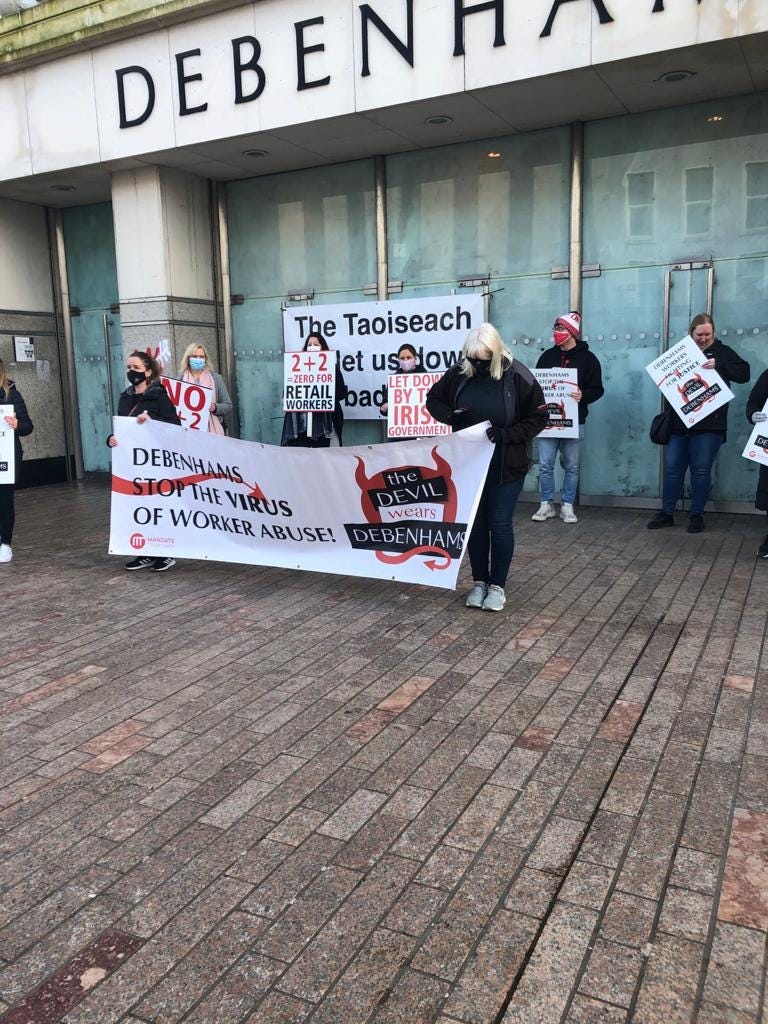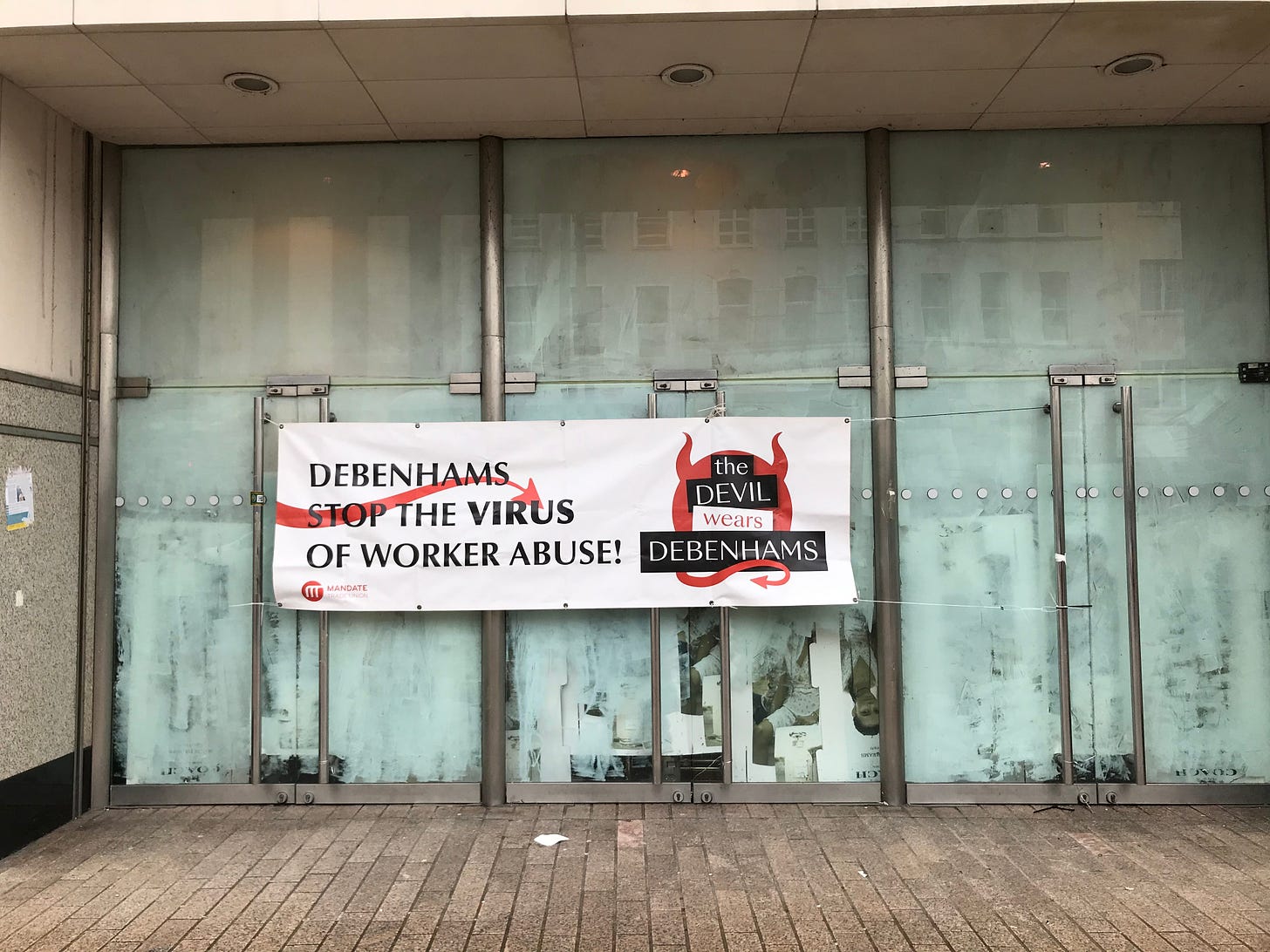Film review: "406 Days" - A Look Back in Anger
Former Debenham workers in Cork are to the front and centre of a new documentary that counts up the days of the longest industrial dispute in Irish labour history.
A few minutes into "406 Days," a new documentary currently on general release that recounts the 13 months of industrial action taken by former Debenhams workers, I realised that I knew one of the women on screen. Her son used to go to the same daycare as mine.
What I didn't know was that when I would meet her at drop-offs in the morning, she, along with scores of other ex-Debenhams workers, was coordinating on WhatsApp to staff the picket lines. The only leverage the ex-workers had was the stock that was left behind when the UK retailer permanently closed its stores in Ireland and offloaded nearly 2,000 workers on April 9, 2020.
The film doesn't dwell much on the financial chicanery that goes on in boardrooms, which is mapped out on spreadsheets and led to Debenhams jettisoning its staff with all the grace of an AI chatbot (Staff received a generic email thanking them for their service). Director Joe Lee doesn't go after the captains/pirates of industry in "406 Days"; rather, the lens is firmly on the women and men who worked at Debenhams, though it's mostly but not exclusively women.
Filmed over the past 12 months, Lee conducted many of the interviews with the former workers inside the shuttered stores. The interior of the empty Roches Stores building on St. Patrick's Street feels like it could be the setting for a post-apocalyptic zombie film. Years on, the shock is still palpable in some of the interviews with the former Debenhams workers, especially considering the throwaway manner of their dismissal.
That sense of shock is understandable; some workers had devoted decades to working in retail. Before she was made redundant by email, Valerie Conlon, a shop steward with Mandate whom I interviewed for T+D in the spring of 2021, had put in 24 years, first at Roches Stores and then at Debenhams when they took over. There were many others like her.
The other dominant emotion in the documentary is anger. These are a group of women who will not go quietly into the night. In fact, they do the opposite. The film shows a smaller group of the strikers breaking into the St. Patrick Street store, as well as the one on Henry Street, spending a few nights occupying the canteen. There are moments of humor too, as one worker recalls how much one of her fellow occupiers would never shut up.
These "break-ins" were designed to keep their plight in the public consciousness and national media. It was a uniquely weird time to stage what has become the longest strike action in Ireland, surpassing even that of the Vita Cortex strikers. The Debenhams strike coincided with the first lockdown and the second lockdown when city centres were largely off-limits for long periods of time. The strikers were often neither seen nor heard, but they still showed up in rain, hail, and wind to stand apart and picket.
However, it's not an altogether angry film. Strikes are about summoning solidarity, and there's laughter and joking too as the clock ticks on and on, and the inevitable day closes in.
Just as work had once united them, the strike becomes a surrogate for work as they fight for a "2+2" package. Agreed in 2016, that would have consisted of two weeks' statutory redundancy and two weeks' ex gratia payments for every year of service.
Lee intersperses his interviews with news footage as well as footage pulled from social media as the calendar counts up the days on the picket line. The title gives away when the film and the strike end, but not how it ends. The ending feels rushed in Lee's hands, but it's also jarring in how it plays out.
KPMG, the liquidators, successfully secured injunctions to clear the strikers and get the stock removed from the stores. In Dublin, Waterford, Tralee, and Limerick, scores of police and rows of police vans moved on the strikers at night, in scenes more reminiscent of police gearing up for a riot. The optics of a small army of police hauling women off the picket line are some of the most poignant and shocking in the film. Business must prevail.
With the stock gone, the leverage that the strikers had disappears. They were never really fighting for the stock; rather, it was workers' rights and legislation because one day it might be your neighbor who is summarily dismissed and inadequately compensated. And another day it could be you.
“406 Days” has won the 2023 Dublin International Film Festival Audience Award, the 2023 ICCL Human Rights Film Award and the 2023 Dublin Film Critics Circle Award for Best Irish Documentary. Earlier this month it was screened at the Dáil. All TDs were invited.
It is now showing at The Gate cinema on North Main Street and at the Omniplex in Mahon Point.







Thanks again for your Cork viewpoint
And detailed article